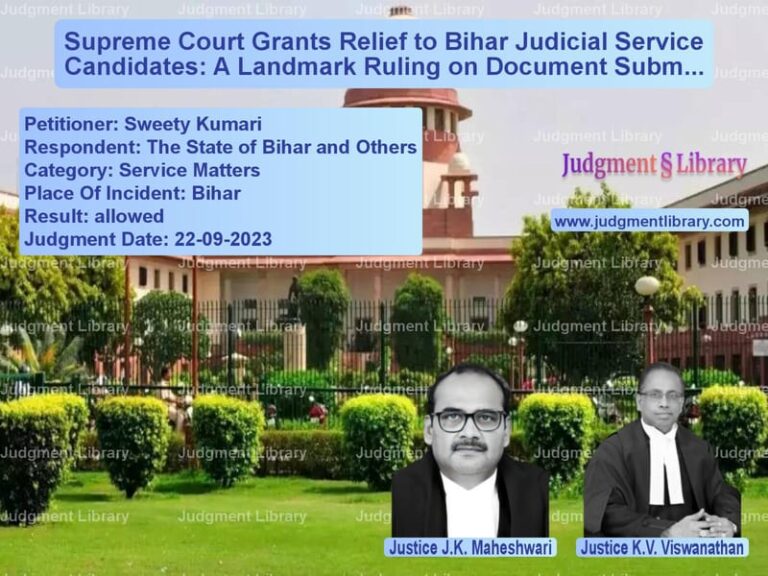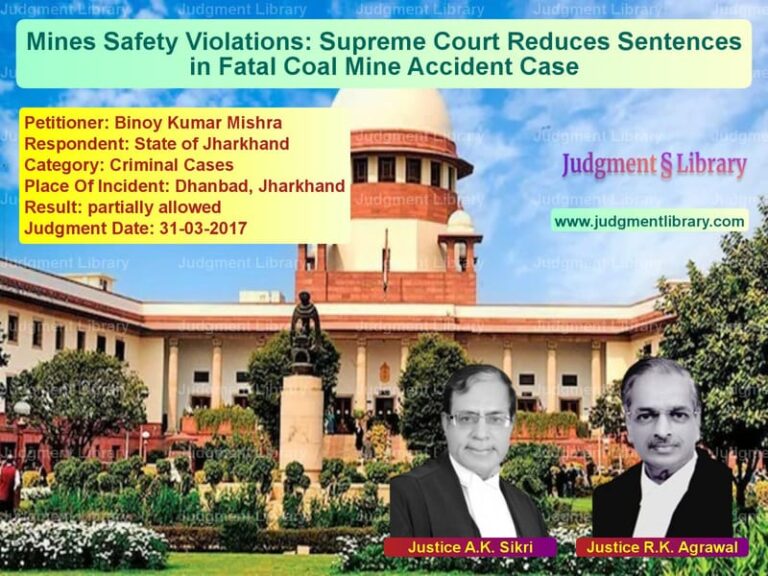Supreme Court Allows Transposition of Defendants as Plaintiffs in Property Dispute
The case of R. Dhanasundari @ R. Rajeswari vs. A.N. Umakanth & Ors. revolves around a complex property dispute where the Supreme Court upheld the transposition of certain defendants as plaintiffs in a suit after the original plaintiffs sought permission to withdraw. The judgment clarifies the interpretation of Order XXIII Rule 1-A read with Order I Rule 10 of the Code of Civil Procedure, 1908 (CPC).
Background of the Case
The dispute began with a civil suit originally filed as O.S. No. 122 of 1989 before the Principal Subordinate Judge, Chengalpattu. The plaintiff, A.C. Nataraja Mudaliar, sought cancellation of a sale deed executed on March 23, 1985, by the first defendant, A.V. Manoharan, in favor of the second defendant, R. Dhanasundari @ R. Rajeswari. The suit was later renumbered as O.S. No. 219 of 2004 after being transferred to the District Munsif, Chengalpattu.
The plaintiff claimed that the suit property originally belonged to the partnership firm, South India Engineering Works, in which he and the first defendant were partners. Upon the firm’s dissolution in 1971, the suit property allegedly vested in the plaintiff, making the sale by the first defendant to the second defendant void.
Key Developments in the Case
Several developments took place during the pendency of the suit:
- The original plaintiff, A.C. Nataraja Mudaliar, passed away on May 19, 1988, and his legal heirs (three sons and four daughters) were impleaded as plaintiffs Nos. 2 to 8.
- One of the sons, A.N. Umakanth (plaintiff No. 5), was given power of attorney by his siblings to handle the case.
- The suit was decreed ex parte in 1995, but the decree was later set aside.
- During this period, A.N. Umakanth sold the property to three individuals: Ramasamy, Dhanam Ramasamy, and Venkatasubramanian, through a registered sale deed on July 4, 1995. These purchasers were subsequently impleaded as plaintiffs Nos. 9 to 11.
- The other plaintiffs objected to this sale, revoked the power of attorney of A.N. Umakanth, and sought to transpose him and the three purchasers as defendants Nos. 3 to 6. The request was granted in 2003.
- When the trial reached an advanced stage, the plaintiffs filed a memo seeking withdrawal of the suit, citing an out-of-court settlement with defendants Nos. 1 and 2.
- The newly transposed defendants (Nos. 3 to 6) objected to the withdrawal and filed an application to be transposed back as plaintiffs under Order XXIII Rule 1-A read with Order I Rule 10 CPC.
Trial Court and High Court Decisions
The Trial Court allowed the application for transposition on July 7, 2005, observing:
- The suit had been pending since 1989, and the applicants (defendants 3 to 6) had a substantial interest in its outcome.
- Withdrawing the suit would leave them without a remedy, as a new suit might be barred by limitation.
- Only the plaintiffs and defendants Nos. 1 and 2 had entered into a compromise, excluding other defendants.
The High Court upheld this order on October 12, 2006, stating:
- Defendants Nos. 3 to 6 were originally plaintiffs and had a direct stake in the dispute.
- The sale by plaintiff No. 5 to plaintiffs Nos. 9 to 11 created new legal rights that needed adjudication.
- The trial court had correctly applied Order XXIII Rule 1-A in allowing transposition.
Supreme Court’s Analysis and Judgment
The Supreme Court examined the facts and legal provisions and upheld the High Court’s ruling. Key observations included:
- “The object of Order I Rule 10 CPC is to ensure that all necessary parties are before the court to adjudicate the dispute comprehensively.”
- “Under Order XXIII Rule 1-A, if a plaintiff withdraws, a defendant with a substantial claim against a co-defendant can continue the suit.”
- “The applicants (defendants 3 to 6) had an identical interest to the plaintiffs and were therefore entitled to be transposed back as plaintiffs.”
- “Denying transposition would force them to initiate a fresh suit, which might be time-barred and lead to multiplicity of proceedings.”
Final Judgment
The Supreme Court ruled:
- The appeal was dismissed, and the transposition of defendants Nos. 3 to 6 as plaintiffs was upheld.
- The suit would continue with the newly transposed plaintiffs seeking cancellation of the 1985 sale deed.
Significance of the Judgment
This judgment clarifies several procedural principles:
1. Protection of Substantial Interests
- Defendants with a legitimate claim against co-defendants can continue litigation if the original plaintiffs withdraw.
- Prevents injustice due to technical procedural maneuvers.
2. Avoiding Multiplicity of Litigation
- Allows substantive issues to be decided in the existing suit rather than requiring a fresh lawsuit.
- Promotes judicial efficiency.
3. Scope of Transposition
- Clarifies when courts can exercise discretion under Order XXIII Rule 1-A CPC.
- Ensures that all interested parties remain part of the litigation.
Conclusion
The Supreme Court’s decision in R. Dhanasundari vs. A.N. Umakanth affirms the principle that procedural law should facilitate justice, not obstruct it. By allowing transposition, the Court ensured that all necessary parties had the opportunity to seek adjudication of their rights, preventing legal injustice due to technical withdrawals.
Petitioner Name: R. Dhanasundari @ R. Rajeswari.Respondent Name: A.N. Umakanth & Ors..Judgment By: Justice Uday Umesh Lalit, Justice Dinesh Maheshwari.Place Of Incident: Chengalpattu, Tamil Nadu.Judgment Date: 06-03-2019.
Don’t miss out on the full details! Download the complete judgment in PDF format below and gain valuable insights instantly!
Download Judgment: R. Dhanasundari @ R. vs A.N. Umakanth & Ors. Supreme Court of India Judgment Dated 06-03-2019.pdf
Direct Downlaod Judgment: Direct downlaod this Judgment
See all petitions in Property Disputes
See all petitions in Specific Performance
See all petitions in Damages and Compensation
See all petitions in Judgment by Uday Umesh Lalit
See all petitions in Judgment by Dinesh Maheshwari
See all petitions in dismissed
See all petitions in supreme court of India judgments March 2019
See all petitions in 2019 judgments
See all posts in Civil Cases Category
See all allowed petitions in Civil Cases Category
See all Dismissed petitions in Civil Cases Category
See all partially allowed petitions in Civil Cases Category







